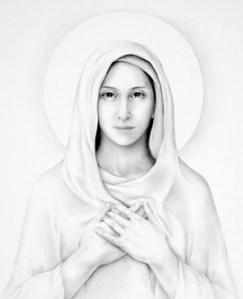Have you ever woken up in the morning and lay in bed a moment longer just to marvel at how blessed you are? I find this an especially easy habit in the springtime. The birds have returned with their song and the sun finds its way to our windows earlier. During this Mother’s Day week, I find myself remembering my mother and being so very grateful that I was blessed to have her for the time I did. I think about all of the mothers in my life from my sister, aunts, and grandmother, to my girlfriends and mentors. I am blessed to have so many strong, female role models to look to and marvel at.
All of the focus on Mother’s Day also has me thinking about our images we employ to explore our relationship with the Triune God. Each week at church we profess our faith in God the Father, God the Son, and God the Holy Spirit. For some individuals the masculinization of these Persons of the Trinity makes it difficult for them to connect to God for a variety of reasons. Likewise, the absence of pronouns when attempting to find a gender-neutral way of talking about God can make God seem impersonal and distant. What if this Mother’s Day could serve as an invitation to consider how our relationship with God would be changed if we thought of God as both our Father and our Mother.
There is biblical precedent for such imagery. In the psalms we find instances of God as a midwife attending a birth. The prophet Isaiah paints the picture of God as a woman in childbirth whose breath during labor pangs is the power of God “lead[ing] the blind” and “turn[ing] darkness into light.” (Isaiah 42:14-17) The Gospel of Luke shows us God as a mother hen desiring to gather her chicks under her wings. (Luke 12:34) In addition to these rich images, we can consider that the noun ruach –the Hebrew word for breath, wind, or spirit that Christians have come to name as the third Person of the Trinity– is a feminine word. Thus, even when these concrete masculine images of Father and Son are being spoken we can hold fast to the femininity of God inherent in the Holy Spirit.
This coming Sunday, when many of us go to Dorchester to march in solidarity with the mothers who have lost their children to violence – when you call your own mother – when you are awoken to breakfast in bed by your children – or when you worship here in Epiphany’s beautiful nave, I hope you will consider the question: How can I invite God to be a mother to me?

Leave a Reply
You must be logged in to post a comment.